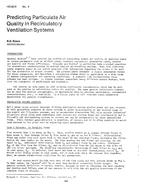The conventional CDD (cooling degree-days) and HDD (heating degree-days) methods of estimating cooling and heating loads have two inherent shortcomings: First, it takes 365 mean daily temperatures to complete. Second, while lumping the daily temperature swing into a mean daily temperature, a certain inaccuracy will be incurred when the mean value is closely above/below the reference temperature and thus not counted as a cooling/heating day, a case frequently encountered in subtropical weathers.
A simplified method for predicting the CDH (cooling degree hour’s) and HDH (heating degree hours) is developed in this paper. It is simple, because only 48 monthly weather data, which can be obtained from any weather observation station, are used. It is accurate, as statistical technique has been applied in calculating the CDH and HDH. Actual calculation also verified that the inaccuracies of the simplified CDH and HDH calculations are about 3% and 8%, respectively.
Actual calculation has been performed in utilizing this principle and the weather data in Taiwan, a subtropical island in the Pacific. The results will be used as bases in weather data categorization and building energy code establishment in this area.
Units: Dual
Citation: ASHRAE Transactions, 1987, vol. 93, pt. 1, New York, NY
Product Details
- Published:
- 1987
- Number of Pages:
- 11
- File Size:
- 1 file , 610 KB
- Product Code(s):
- D-NY-87-3021


